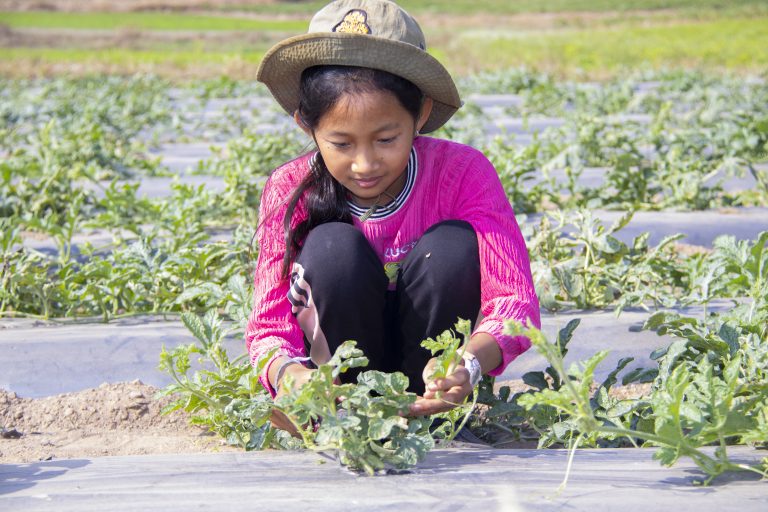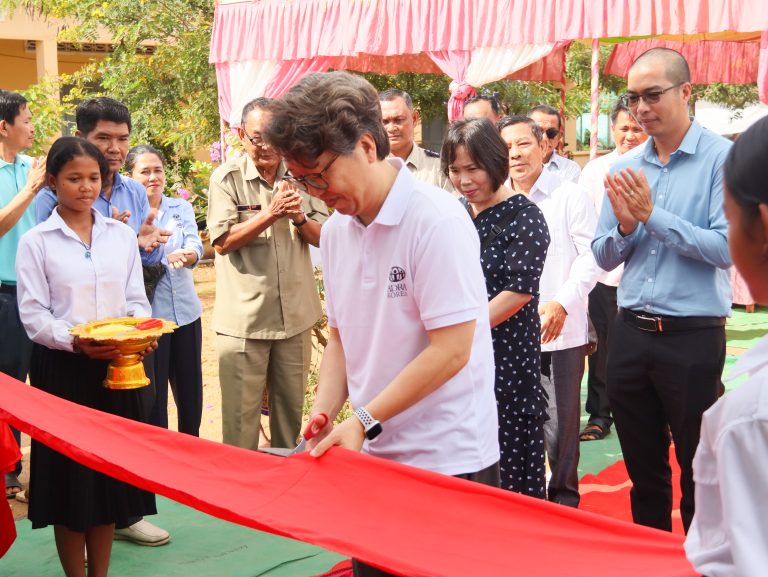Pursat Community Sponsorship
Pursat Community Sponsorship
Date: 1 January 2023 to 31 December 2025
Area: Kravahn District, Kondieng District and suburb of Pursat town, Pursat Province
Beneficiaries: 700 community members
Budget: TOTAL USD 280,410
Donor: ADRA Korea
ADRA is working through a new Adventist Community Services project in both of these new villages in partnership with the Seventh-day Adventist church. It will work in a holistic manner and emphasize the need for local ownership and self-initiation in the change process. It will allow HH to better assess current agriculture and livelihood practices, new appropriate technologies and opportunities, and be able to act on identified areas of potential improvement.
As agriculture is the backbone of the rural target communities, PCS III will build on this base of knowledge in rice, vegetable and fruit, animal production and other rural livelihoods and give HH the opportunity to make improvements and changes that will result in increased value of products and income in a sustainable manner. And also vocational skills training will be provided to those who are interested in (repairing machines, sewing, cosmetic skill etc.) to increase HH income.
Challenges in rural areas don’t usually have the opportunity to experience the benefits of education. One reason for this is the low quality of the surrounding environment, which discourages them to spend their time studying and affects their way of thinking. In the rural area, many children quit their studies because of things like having the responsibility of helping their parents in the field, working at the farm for money, work in a factory or finding other outside work. Many families become so indebted to microfinance companies that their only hope is to make more money from migration of the whole family or part of the family. This causes children to drop out of school to find work, and even migrate. Through analysis in experience of PCS I and PCS II the point of view regarding to children quit study and children migration are decreased a little bit or even stable or unstable.
PCS III will target 250 children and their parents and or primary caregivers (750), and aims to improve their education, the physical community environment and strengthen community interaction in the 11 villages (9 villages in Kravahn District, 1 village in Kandieng district, and 1 village in Sampov Meas district. The 250 children will benefit from school materials, hygiene/sanitation materials, extra classes and their parents/caregivers will benefit from agricultural training and vocational training. 750 primary beneficiaries, including family members and community members will benefit from agriculture, vocational skills, livelihoods, Wat-San facilities and literacy trainings. PCS III will focus on improving the lives of the poor and more vulnerable segments of communities while recognizing that this process includes the participation and modeling from more stable community HH.
Project Log-Frame
Project Goal:
| Improved community, economic and learning environments for poor and vulnerable Reflect Circle (RC) members and their families in Kandieng district, Kravahn District and rural villages around Pursat Town, Pursat Province, Cambodia. |
Outcome 1: | To ensure that (250) poor and vulnerable school-aged children are supported to finish high school.
|
100% of sponsored children remain in school and pass their tests moving to the next grade each year. | |
Outcome 2: | To increase the economic skills and sustainable incomes of (750) poor and vulnerable families with children. |
70% of PCS HH members who express that they have greater skills and decision making capacity from involvement in RCs.
50% literacy participants pass standard literacy and numeracy evaluation testing 70% of vocational skill training participants who are utilizing new skills for income generation. | |
Outcome 3: | To improve the environment and protective health practices for (900) poor and vulnerable households. |
| 1400 Target community members have improved hygiene knowledge and protective health practices |
CROSS-CUTTING ISSUES
Gender And Development (GAD): The gender roles of Cambodian society are “essentially” matriarchal. Women in a family usually hold the family cash and spend money for day to day HH uses, but do not necessarily have influence on the use of cash or resources for major purchases. When couples marry, if they do not move to their own house (which is not common), they will usually move to the wife’s family house. However, women are often the main caregivers and more responsible for the HH chores than husbands and have little say over external income generating activities such as rice farming or major gardening production. Beyond this tradition of male dominance, community tolerance of domestic violence against women, and high rates of alcohol abuse by men have left women in a more vulnerable position.
The PCS III project is focused directly on creating a positive informed environment in HH. This process includes improvement of communication skills, improving general awareness of practical technical agriculture and vocational skills, and good hygiene and sanitation practices, and seeks to provide opportunities for men and women to develop habits of joint decision making and sharing of labor roles within the HH
Child Protection: ADRA has a child protection policy in place which principles are based on the UN Convention on the Rights of a Child. The PCS II project will promote a child-safe environment through active implementation of policy and practice at all levels. Project staff and partners will seek to both understand and carry out project interventions in a manner safeguarding the rights of all children within the project target areas. Each project staff will receive orientation in ADRA Cambodia’s child protection policy and code of conduct and sign the code of conduct.
SUSTAINABILITY: the PCS III approach which uses the Reflect-action methodology. Rather than targeting individual poor households or children on their own, RCFs will lead their members as a group towards shared goals while learning from each other. While decisions to join training are individual and will involve experimentation on a personal level, the forming of interest groups build social cohesion and community wide traditions at a social level. Behaviour change over time, especially for women, will instil a culture of sharing and experimentation.
New financial and other basic household business skills will be sustained and where needed, HHs will be linked to sources of financing from micro-finance vendors. Families will have improved livelihoods in agriculture production such as sustained improvements in rice and vegetable production, in vaccination and timely treatment of sick animals which will lead to healthier and larger stocks of animals. The additional empowerment and mutual decision making led by women should increase more equitable division of labour and protection of overall family needs.
PCS Stories
Latest stories from PCS project

A Story of Strength and Hope
Chheng Sreyma’s story is one of resilience and hope. With determination and support, even the smallest seeds can grow into something extraordinary.

ADRA Inaugurates New Cafeteria and Handwashing Station at Koul Totung Primary School in Pursat Province
Pursat Province, Cambodia, September 25, 2024 – The Adventist Development and Relief Agency (ADRA) Cambodia, in collaboration with ADRA Korea, proudly announces the inauguration of a new cafeteria and handwashing station at Koul Totung Primary School, Kravanh District, Pursat Province.

Bid Building Announcement
The Adventist Development and Relief Agency (ADRA) Cambodia is seeking construction contractors interested in bidding for the construction of buildings at two different schools. ADRA plans to build at two different locations.




